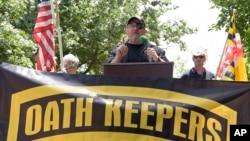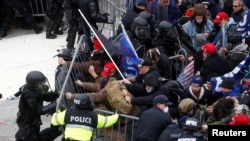Stewart Rhodes, the founder of the anti-government Oath Keepers militia, and a former top lieutenant were sentenced on Thursday to 18 and 12 years in prison respectively for their roles in the violent storming of the U.S. Capitol on January 6, 2021.
Rhodes' sentence is the longest imposed so far on any defendant in the attack by supporters of former U.S. President Donald Trump.
Prosecutors wanted 25 years for Rhodes and 21 years for Kelly Meggs, the leader of the militia's Florida chapter. The previous longest sentence had been 14 years.
Rhodes and Meggs were convicted in November of seditious conspiracy against the U.S. government for leading the bloody assault while Congress was preparing to confirm current U.S. President Joe Biden's electoral victory over Trump.
"You, sir, represent an ongoing threat and peril to this country and to the republic and to the very fabric of this democracy," U.S. District Judge Amit Mehta told Rhodes before handing down the lengthy sentence.
'Grave threat'
In a statement, Attorney General Merrick Garland said, "Today's sentences reflect the grave threat the actions of these defendants posed to our democratic institutions."
FBI Director Christopher Wray said the sentences reflect the bureau's commitment "to hold accountable individuals who committed criminal acts on January 6, 2021, as well as those who plotted to interfere with the lawful transfer of power."
Rhodes, who founded Oath Keepers in 2009, stood outside the Capitol on January 6 acting like a "general surveying his troops on the battlefield," according to prosecutors, while Meggs led "a military-style stack" of 14 Oath Keepers up the steps, into the building, and into the rotunda.
The deadly rampage, joined by nearly 2,000 rioters, led to the deaths of five people, injured more than 100 police officers, and sparked one of the largest criminal investigations in U.S. history. More than 1,000 people have been arrested on charges related to the attack, and the FBI says it's looking for hundreds more.
A defiant Rhodes took the stand before his sentencing to declare that he is a "political prisoner" — an "American Solzhenitsyn" — and that his "only crime is opposing those who are destroying our country."
Claiming that the Oath Keepers, unlike the far-right Proud Boys, is a nonviolent group, Rhodes said he did not want his followers to enter the Capitol and admonished them when he learned they had breached the grounds.
But prosecutors portrayed Rhodes, a Yale-educated former Army paratrooper, as the mastermind of the plot and said he used his influence as the militia chief to get his men to use "force, intimidation and violence" to overturn the election.
While dozens of Oath Keepers stormed the Capitol at Rhodes' direction, according to prosecutors, armed "quick reaction force" teams were on standby outside Washington, ready to deploy into the city in support of the assault on the Capitol.
Defendant expresses regret
Assistant U.S. Attorney Jeffrey Nestler said in court on Thursday that except for Rhodes, Meggs, a former car dealership manager, was the "intellectual and moral leader" of the January 6 conspiracy.
"It was Meggs telling the Oath Keepers: do this or die," Nestler said.
Pleading for leniency, an emotional Meggs expressed regret for being involved in "an event that put such a black eye for our country" but insisted that "I was not there to cause or instigate violence."
Echoing a defense claim throughout the Oath Keepers trial, Meggs said there was no plan to breach the Capitol and that the Oath Keepers were in Washington to provide security for Trump supporters.
Mehta was not convinced.
He cited an encrypted message recovered by prosecutors in which Meggs declared to his followers in Florida that "this is the moment we signed up for" and that "the real question is who is willing to DIE."
Then Meggs headed to Washington with a cache of weapons — "many of them in your truck" — and hid them at a hotel outside the city for "emergency purposes," Mehta said.
"Why do you need that for a security detail?" he asked.
Mehta said he imposed a shorter sentence on Meggs than on Rhodes in part because he did not pose the same threat as the Oath Keepers leader.
Meggs's 12-year sentence is the third-longest imposed on a January 6 defendant. Earlier this month, another January defendant, Pennsylvania welder Peter Schwartz, was sentenced to a little more than 14 years.
Rhodes and Meggs were tried along with three other Oath Keepers last year — Jessica Watkins, Kenneth Harrelson and Thomas Caldwell. The trio were acquitted of seditious conspiracy but found guilty of obstruction of an official proceeding and aiding and abetting.
Watkins and Harrelson are scheduled to be sentenced on Friday.
The Oath Keepers is one of two far-right groups whose leaders have been convicted of seditious conspiracy for the January 6 assault.
Earlier this month, Proud Boys chairman Enrique Tarrio and three associates were also found guilty of the charge.
14 convicted
In all, 14 members of the Proud Boys and Oath Keepers have been convicted of or pleaded guilty to seditious conspiracy.
U.S. Attorney Matthew M. Graves noted that more people have been convicted of seditious conspiracy in connection with the January 6 attack than any other criminal event since the statute was enacted during the Civil War.
"Today's sentencing affirms the rule of law and imposes substantial consequences on Stewart Rhodes and Kelly Meggs who, together, conspired to violently attack our government and our democracy," Graves said in a statement.
Composed primarily of military veterans and former law enforcement officers, Oath Keepers see themselves as part of a broader patriot movement that believes that the government is infringing on their rights.
In recent years, they have used anti-immigrant and anti-Muslim rhetoric. Although they disavow violence, several members have been convicted of serious crimes over the past decade.
(Editor's note: This update corrects Kelly Meggs' sentence to 12 years from more than 15 years)














